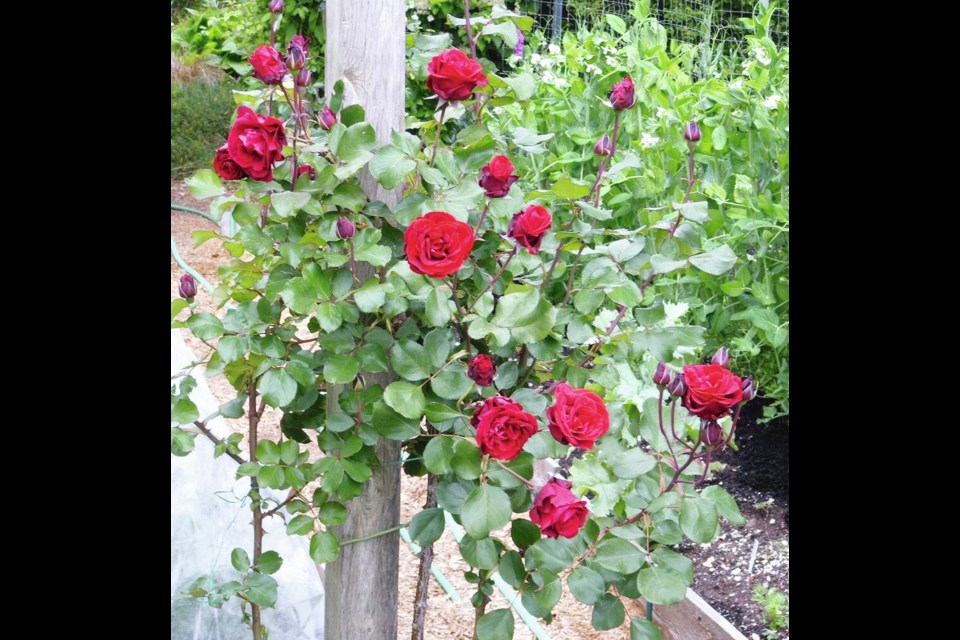Dear Helen: Do you have a favourite red rose, and do you know why red roses have become the most popular choice for expressing high regard or affection?
B.A.
I have just one red rose in the garden, a climbing rose called Don Juan, which I grow at a corner of a vegetable plot, in the style of old monastery gardens, as a “pillar” rose. Not all climbing roses bloom well grown in such an upright style, but Don Juan is one of them.
It’s an intrepid rose, easy to care for and a continuous bloomer as waves of flowers follow each other through the summer and early autumn. The roses are beautifully formed, and very fragrant.
The association of red roses with love and respect goes back to ancient myths and lore. Aphrodite, the Greek goddess of love, is said to have created the red rose when, rushing to the aid of her lover, she is wounded by the thorns of a rose bush. Her immortal blood stained the roses forever. Red is linked with blood, and the heart.
The red rose has also been associated with love’s pain. This was highlighted in the touching final scene of a recent PBS episode of All Creatures Great & Small. As James says a painful good-by to his beloved wife Helen and leaves for war, he gazes at his wedding photo and remembers the Robert Burns poem “My luve is Like a Red, Red Rose.”
“And fare thee weel, my only Luve!
And fare thee weel awhile!
And I will come again, my Luve,
Tho’ it were ten thousand mile.”
Dear Helen: I was interested in your thoughts on seed sources in a recent column. Do you know why Juliet tomato and some other varieties are unavailable in Canada this year? Johnny’s Selected Seeds lists Juliet but does not ship the seeds to Canada. I’ve been growing Juliet for a number years, and have found it to be a prolific producer from early in the season into the fall. I’ve not been able to find a Canadian source for Juliet seed.
M.G.
It’s odd that Juliet seed has suddenly become harder to find. The only Canadian source I can find is W.H. Perron in Quebec. T&T Seeds (Winnipeg) lists it but they note that Juliet is currently out of stock and unavailable.
I don’t know why Johnny’s does not ship seed for this and some other tomatoes to Canada. Perhaps the supply is limited because of some issues with the seed crop last year. I have emailed them to ask.
Juliet has been a popular, award winning variety for the characteristics you
describe and for the general health of the plants and their grape-like clusters of small Roma type tomatoes.
For the best chance at acquiring seed for this year, I suggest ordering online from Perron.
Dear Helen: Some of your recent columns have mentioned preparing plots for planting with additions to the soil of compost, fertilizer and lime “except for potatoes.” Why no lime for potatoes?
S.L.
An organism that lives in many soils is scab, a disease that mars the appearance of potatoes, though it does not affect the yield. When developing tubers become infected, their response is to form unsightly corky tissue on the skins. The scabby blemishes are shallow. Harvested tubers remain edible with the removal of the affected skin areas.
Conditions favouring infections are light-textured, sandy soils that tend to be alkaline, especially if they become warm and dry in summer.
Scab can be limited or avoided by ensuring the soil is kept slightly to moderately acidic by not using lime, which raises pH (acid-alkaline) levels toward or into the alkaline range. To help ensure a hearty soil texture and improve moisture retention, add plenty of compost ahead of planting
As temperatures rise and the soil warms, mulch generously around the plants with loose layers of leaves or straw, to shade and cool the soil and the developing potato tubers.
GARDEN EVENT
Rose pruning. Dinter Nursery, 2205 Phipps Rd. in Duncan, is presenting a rose pruning demonstration on Saturday, Feb. 17, 10 to 11 a.m. Nat, Dinter’s resident landscape horticulturist, will show participants how to prune their roses. This demonstration will take place outdoors or in an unheated greenhouse. Please dress warmly. The demonstration is free of charge. No registration is required.



